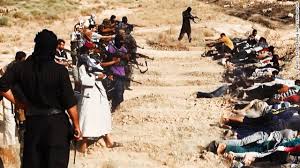ISIS is undoubtedly the most fearful terrorist organization in the whole world and it is now gaining the upper hand not only in its original countries, specifically the Arabic and North African ones, but also it is spreading terror among Western and European countries. The question that arouses is whether such a phenomenon might go on being only a threaten for us or it will become a serious issue for our countries in the future.
Firstly, it is worth reminding that the exponents of such terrorist association are seeking to give light to an Islamic State centred on the devotion and the worship in favour of Allah. Islamists are planning to take over control of those countries in which they are acting. Ever since the birth of the movement under Saddam Hussein in 2003, the movement has been constantly expanding its range of action. According to some very approximate figures, the number of members adhering to the movement rounds up to ten thousands, a number which is yet bound to increase.
What suggests instability within the group, however is the continuous alternation of its leaders, something which hints the lack of a organized structure within the organization and the failure of the projects undertaken by the movement. One of the first leaders, Bin Laden, was indeed killed in his lair by the American agents. Another important person within the organization, Al Queida, parted with the organization itself last year because his interests did not match any longer with those of the other exponents. The argument that many seem to claim is that such movement looks more like a bunch of thug people whose aim is to terrorise the world through scattered attacks. As a consequence, can it really undermine the safeness in western countries, which are so developed under any standpoint and in particular so well equipped under the military point of view?
The thing is that everything comes down to how strong interests are. It is clear that in their countries such people are finding fertile ground thanks to the fact that they are great consumers of arms and suppliers such as the United States and Italy will never renounce to such a source of earning for their country. One of the very last attacks took place in Tunisia, Sousse in which 38 people passed away (by the way, the tourist industry is now collapsing in the country). Moreover, it is also true that some countries such as Saudi Arabia are the main suppliers of oil for western countries and it is not by chance that in such countries the problem of the rebels does not exist, or at least it exists but in a lower extent. What’s more, the ISIS’ power is not to be underestimated, in the sense that it is able to attract and hire a huge amount of soldiers thanks to the great reserves of money that allows to guarantee a salary that is about three times the average.
However, the situation in Europe and in the US is pretty different; the organization of northern countries allows to be sure about their safeness and there is a factor that matters that is exactly what has been previously said: some of them are exactly the countries which go on having mutual interests with ISIS and it is not possible to undermine them through a fierce war. What is ISIS trying to do actually is giving the idea of its power where needed, where its image is vituperated. The very first example that would spring to mind is the attack that took place in Paris some time ago against Charlie Hebdo, the journal which was publishing satirical articles against the organization.
Last but not least, the financial situation of the organization seems to be very unstable, for its sources of revenue are not very reliable in future perspectives. Contributions from donors and unjustified taxes are among the main source of income, and it is clear that such an important organization cannot count on such an unsafe source. The oil fields of conquered territories provide ISIS with huge revenues, but are we sure that the US could not control them if it wanted?
Everything suggests that the plan for the movement is that of creating a State in its own area, which will then try to expand in other regions once formed and organized. By the way, the messages threatening Rome are clear during these days and it is clear that such a target is the centre of the enemy power in terms of religion. However, western superpowers seem to be able to keep the general control of the situation, both in the short and in the long run, even though the shade of scattered attacks is always feasible and terrifying.

